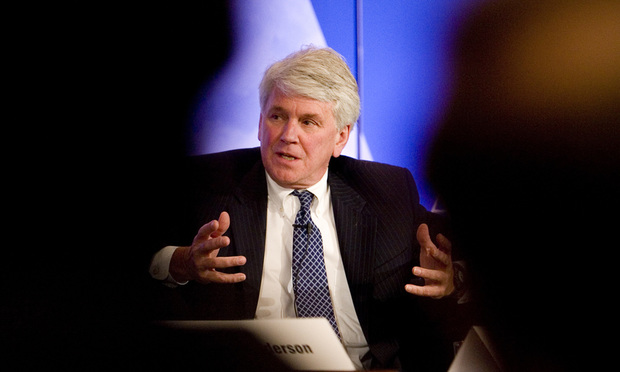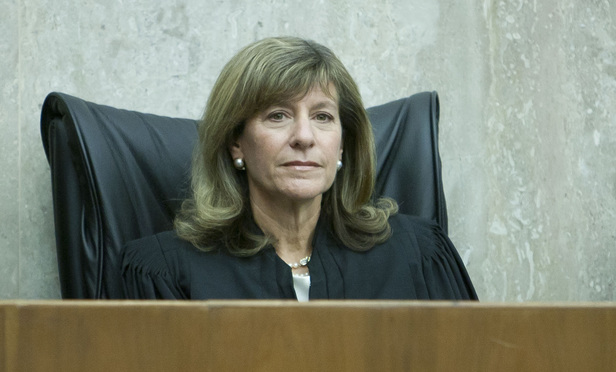'Are You Telling Me We Need to Start Over?' How Greg Craig's Trial Hit a Snag
U.S. District Judge Amy Berman Jackson defended closed-door jury selection proceedings. But the trial is starting over Wednesday, with a new set of prospective jurors.
August 13, 2019 at 01:47 PM
5 minute read
The original version of this story was published on National Law Journal
 Gregory Craig speaking in Washington in 2008. Photo: Diego M. Radzinschi/ALM.
Gregory Craig speaking in Washington in 2008. Photo: Diego M. Radzinschi/ALM.
The trial of Greg Craig was unexpectedly thrown off-course Tuesday when defense lawyers for the former White House counsel objected to a jury selection that has played out largely behind closed doors, prompting a Washington federal judge to restart the process from scratch.
U.S. District Judge Amy Berman Jackson of the District of Columbia barred the public from sitting in on the bulk of questioning Monday, a step she said would protect the privacy of jurors in the closely watched case. Prosecutors and Craig’s defense team did not object at the time, and after hours of reviewing potential jurors, the two sides had been expected to present opening statements Tuesday.
Instead, Jackson spent the second day of Craig’s trial addressing questions about whether the closed-door questioning of jurors had violated his rights to a fair trial under the Sixth Amendment. A defense lawyer for Craig, Zuckerman Spaeder partner William Murphy, said the Justice Department had initially raised that concern following Monday’s proceedings.
Murphy said the Justice Department’s concerns had taken Craig’s defense team “by surprise.” “In thinking about it all in hindsight,” Murphy said, Craig’s defense team came to share those concerns.
“Are you telling me we need to start over?” Jackson asked.
“Yes,” Murphy replied.
After taking an hour-long recess, Jackson said she would summon between 120 and 125 new jurors for questioning that will begin Wednesday. The remaining jurors from the initial pool of 70 were dismissed.
 U.S. District Judge Amy Berman Jackson. Photo: Diego M. Radzinschi/ALM
U.S. District Judge Amy Berman Jackson. Photo: Diego M. Radzinschi/ALMMurphy on Tuesday also raised separate concerns about steps the court had taken to ensure that the initial pool of jurors would be available for a two-week trial in August. The so-called “pre-selection” process allowed some prospective jurors to learn in advance that they were being called in connection with Craig’s case, Murphy said.
When Jackson agreed to draw from a general pool of jurors, rather than a prescreened group, Murphy said, “I think that’s the safest course, your honor.”
“We want the regular people,” he added, to laughter from the courtroom.
Craig, who served as President Barack Obama’s first White House counsel, was charged in April with misleading the Justice Department about his work for Ukraine during his time as a partner at Skadden, Arps, Slate, Meagher & Flom. Prosecutors have alleged that Craig deceived the Justice Department to avoid disclosing his Ukraine work under the Foreign Agents Registration Act, a law requiring the disclosure of foreign influence in the U.S.
Although Jackson agreed to begin jury selection anew, she defended her initial decision to close the courtroom, saying it was intended to give prospective jurors the comfort to provide “complete and candidate answers.” It also removed the need for lawyers to repeatedly gather at the bench under the veil of white noise, known as the “husher,” to hear jurors respond to sensitive questions.
“This procedure, I think, made the process easier for the parties and the lawyers,” Jackson said.
During Monday’s proceedings, she said, one juror discussed a mental illness and another mentioned a family member who’d been convicted of an “egregious crime.”
Jackson said she would advise prospective jurors Wednesday that they could respond sensitive questions with the “husher” turned on.
On Monday, before shutting the public out of her courtroom, Jackson allowed several reporters to observe a round of initial questioning in which jurors gave written answers. On blue note cards, the jurors responded to 26 questions designed to discern whether they would bring any improper bias to Craig’s case.
The larger, newly called juror pool will gather Wednesday in the ceremonial courtroom of the E. Barrett Prettyman U.S. Courthouse in Washington to give written answers to the same 26 questions. The individual questioning will be held in Jackson’s courtroom.
“If someone wants to come in and watch it, they will watch it,” Jackson said.
With the delay in jury selection, Craig’s trial is now expected to stretch past Labor Day. During a lighter exchange Tuesday, Jackson recalled that Murphy had vacation plans the Friday before the long weekend.
“I don’t know why I remember your vacation schedule, but I do,” Jackson said.
“For me, it’s a four-day weekend,” Murphy replied, drawing further laughter from the courtroom.
Read more:
Greg Craig’s Trial: The Foreign-Lobbying Registration Case That Isn’t
Quinn’s William Burck Is Now a Registered ‘Foreign Agent’ for Kuwaiti Contractor
Registering as a ‘Foreign Agent’? Why Law Firms and Lobby Shops Might Demur.
Manafort Judge Says Foreign Lobbying Law Is No ‘Pesky Regulation’
The Curious Case of Joe Lieberman’s Work as a Lobbyist Who Isn’t ‘Advocating’
Greg Craig, Defiant After Lobbying Charges, Will Plead Not Guilty
This content has been archived. It is available through our partners, LexisNexis® and Bloomberg Law.
To view this content, please continue to their sites.
Not a Lexis Subscriber?
Subscribe Now
Not a Bloomberg Law Subscriber?
Subscribe Now
NOT FOR REPRINT
© 2025 ALM Global, LLC, All Rights Reserved. Request academic re-use from www.copyright.com. All other uses, submit a request to [email protected]. For more information visit Asset & Logo Licensing.
You Might Like
View All
Statute of Limitations Shrivels $5M Jury Award to Less than $1M, 8th Circuit Rules
4 minute read
Read the Document: DOJ Releases Ex-Special Counsel's Report Explaining Trump Prosecutions
3 minute read
Arizona Board Gives Thumbs Up to KPMG's Bid To Deliver Legal Services

Goodwin to Launch Brussels Office With Quinn Emanuel Antitrust Partner
3 minute readTrending Stories
- 1Family Court 2024 Roundup: Part I
- 2In-House Lawyers Are Focused on Employment and Cybersecurity Disputes, But Looking Out for Conflict Over AI
- 3A Simple 'Trial Lawyer' Goes to the Supreme Court
- 4Clifford Chance Adds Skadden Rainmaker in London
- 5Latham, Kirkland and Paul Weiss Climb UK M&A Rankings
Who Got The Work
J. Brugh Lower of Gibbons has entered an appearance for industrial equipment supplier Devco Corporation in a pending trademark infringement lawsuit. The suit, accusing the defendant of selling knock-off Graco products, was filed Dec. 18 in New Jersey District Court by Rivkin Radler on behalf of Graco Inc. and Graco Minnesota. The case, assigned to U.S. District Judge Zahid N. Quraishi, is 3:24-cv-11294, Graco Inc. et al v. Devco Corporation.
Who Got The Work
Rebecca Maller-Stein and Kent A. Yalowitz of Arnold & Porter Kaye Scholer have entered their appearances for Hanaco Venture Capital and its executives, Lior Prosor and David Frankel, in a pending securities lawsuit. The action, filed on Dec. 24 in New York Southern District Court by Zell, Aron & Co. on behalf of Goldeneye Advisors, accuses the defendants of negligently and fraudulently managing the plaintiff's $1 million investment. The case, assigned to U.S. District Judge Vernon S. Broderick, is 1:24-cv-09918, Goldeneye Advisors, LLC v. Hanaco Venture Capital, Ltd. et al.
Who Got The Work
Attorneys from A&O Shearman has stepped in as defense counsel for Toronto-Dominion Bank and other defendants in a pending securities class action. The suit, filed Dec. 11 in New York Southern District Court by Bleichmar Fonti & Auld, accuses the defendants of concealing the bank's 'pervasive' deficiencies in regards to its compliance with the Bank Secrecy Act and the quality of its anti-money laundering controls. The case, assigned to U.S. District Judge Arun Subramanian, is 1:24-cv-09445, Gonzalez v. The Toronto-Dominion Bank et al.
Who Got The Work
Crown Castle International, a Pennsylvania company providing shared communications infrastructure, has turned to Luke D. Wolf of Gordon Rees Scully Mansukhani to fend off a pending breach-of-contract lawsuit. The court action, filed Nov. 25 in Michigan Eastern District Court by Hooper Hathaway PC on behalf of The Town Residences LLC, accuses Crown Castle of failing to transfer approximately $30,000 in utility payments from T-Mobile in breach of a roof-top lease and assignment agreement. The case, assigned to U.S. District Judge Susan K. Declercq, is 2:24-cv-13131, The Town Residences LLC v. T-Mobile US, Inc. et al.
Who Got The Work
Wilfred P. Coronato and Daniel M. Schwartz of McCarter & English have stepped in as defense counsel to Electrolux Home Products Inc. in a pending product liability lawsuit. The court action, filed Nov. 26 in New York Eastern District Court by Poulos Lopiccolo PC and Nagel Rice LLP on behalf of David Stern, alleges that the defendant's refrigerators’ drawers and shelving repeatedly break and fall apart within months after purchase. The case, assigned to U.S. District Judge Joan M. Azrack, is 2:24-cv-08204, Stern v. Electrolux Home Products, Inc.
Featured Firms
Law Offices of Gary Martin Hays & Associates, P.C.
(470) 294-1674
Law Offices of Mark E. Salomone
(857) 444-6468
Smith & Hassler
(713) 739-1250








